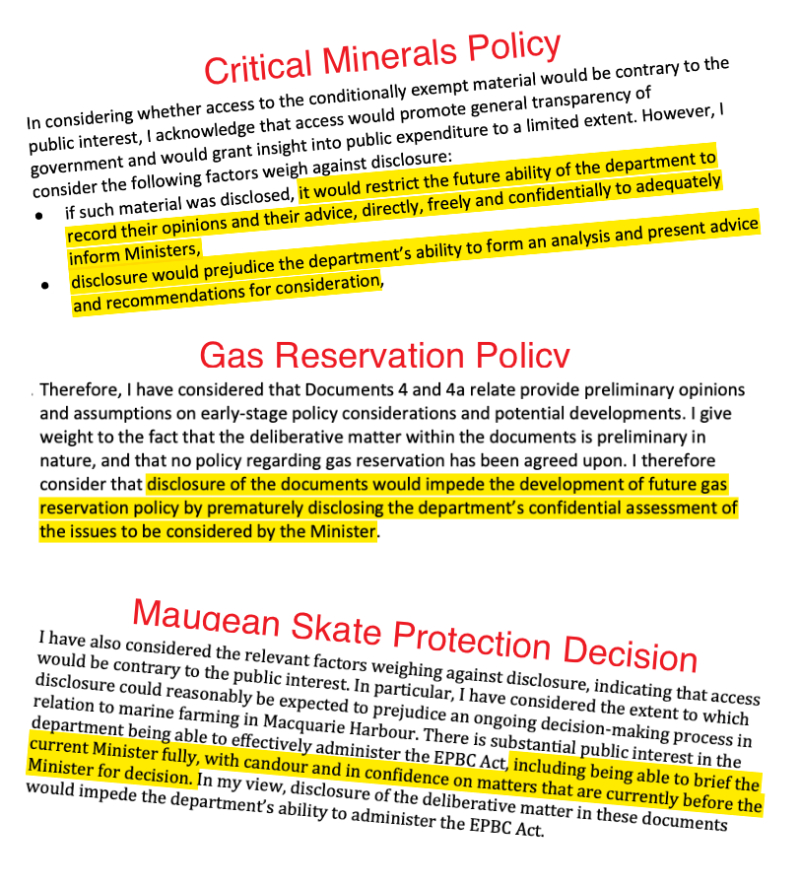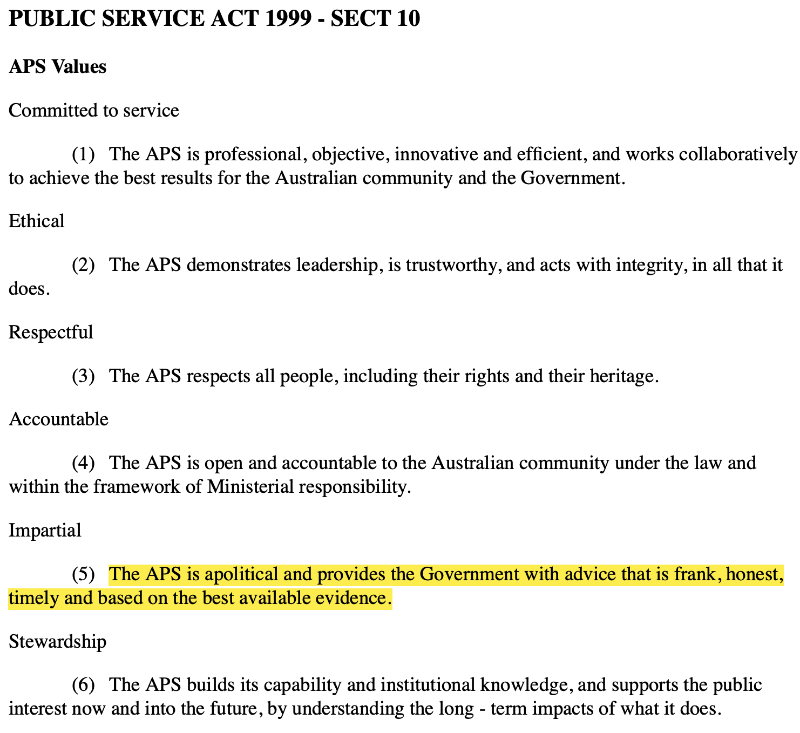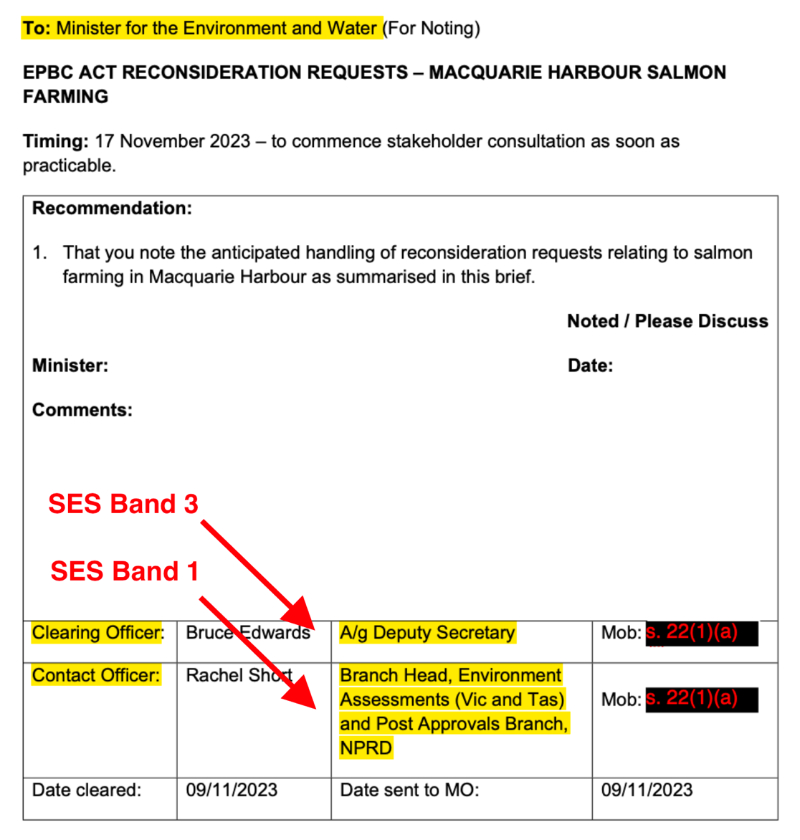
The Albanese Government’s proposed changes to Freedom of Information laws will deny access to any document of the government that involves controversy. FOI guru Rex Patrick explains.
Just how fearless is advice that the author fears the public will see?
In the current Freedom of Information (FOI) Act, parts of a document can be redacted if the contents would disclose deliberative matter; that is, advice, recommendations and consultations. It’s a catch-all exemption deployed regularly in response to document requests.
However, the exemption is conditional. Even if the material is deliberative in nature, it must still be made available to the public unless doing so would be contrary to the public interest.
In trying to support the idea that the release of deliberative material would be contrary to the public interest, departments regularly raise the so-called ‘chilling effect’ that disclosure would have on public servants’ advice.

Excuses, Excuses (Source: FOI)
No shrinking violets?
The problem with the arguments used by FOI decision makers is that ‘shrinking violets’ in the Commonwealth public service are not allowed.
Section 10 of the Public Service Act requires public servants to be professional, trustworthy, open and accountable, and provide the Government with
advice that is frank, honest, timely and based on the best available evidence.
There is no scope for officials to depart from this – doing so would place them in breach of law and subject to disciplinary action or dismissal.

APS Values (Source: Federal Register of Legislation)
In a recent FOI appeal (Rex Patrick and Secretary, Department of Climate Change, Energy, the Environment and Water) the Administrative Review Tribunal gave the public service a boot up the backside stating in no uncertain terms that they must always give the best advice; always. In his decision Dr Nicholas Manetta, who did his PhD on administrative law, said amongst other things:
“The FOI Act was passed in 1982, more than forty years ago.
“I do not accept the general premise of [a senior public servant’s] contention; namely, that public servants in the respondent’s Department expect today to work in an environment of confidentiality in relation to their preliminary advice and reports to the Minister.”
He went on to state:
“To the contrary, I believe I should proceed on the basis that public servants are aware, at least in a general way, that the FOI Act,
may require disclosure of departmental work, whether of a preliminary nature or otherwise.
He then turned to how a senior manager should deal with an official who might want to back off on advice in the face of the possibility of it being disclosed under FOI, saying;
“If there is a risk of the type identified by [a senior public servant], there appears to be a relatively straightforward way to address it; namely, by reinforcement of APS values within her agency (whether by formal direction or otherwise).”
A win for transparency, a blow to secrecy, a loss for the Maugean Skate
Secrecy move
In an attempt to overturn this decision and prevent government advice from being seen by the public, Prime Minister Anthony Albanese wants to introduce the following into the FOI Act:
“If the document is conditionally exempt under section 47C (deliberative processes), factors that are against giving access to the document in the public interest include whether giving access to the document would, or could reasonably be expected to,
-
- prejudice the frank or timely discussion of matters or exchange of opinions between participants in deliberative processes of government for the purposes of consultation or deliberation in the course of, or for the purposes of, those processes;
- prejudice the frank or timely provision of advice to or by an agency or Minister, or the consideration of that advice after it is provided;
- prejudice the orderly and effective conduct of a government decision-making process.”
Despite the law not permitting public servants to back off on their advice, Albanese wants to deny the public access to information it should be entitled to see; advice being given to ministers that will, by its very nature, affect citizens’ lives.
So poorly thought out is the provision, the proposed new law doesn’t prevent other advice ‘chilling’ disclosures.
The Parliament (Senate in particular) can call for advice, the courts can call for advice, and the Auditor-General can call for advice. So, if the aim of the law is to bolster the confidence of public servants that their advice will remain private to ministers, it fails from the start.
Hiding controversy
The real motive for this change is to prohibit the public from seeing what’s happening behind the curtains of the offices of government. Secrecy for secrecy’s sake.
And the ‘chilling’ excuse they wish to use for protecting their fearful advice
will have the greatest weight when the advice is on a controversial topic.
The new provision in the Bill is designed to ensure that nothing controversial makes it into the public domain. How’s that for open and transparent government?
The price is wrong
Briefs or submissions sent to a minister are finalised and cleared by very senior personnel in the Senior Executive Service (SES). They are very well paid.

Example of Ministerial Brief Sign Off
An SES Band 1 gets between $166K and $362K, an SES Band 2 gets between $218K and $418K and an SES Band 3 gets between $293K and $468K.
And for those salaries, Anthony Albanese thinks it’s OK for them to back off on their advice.
Advice not worth considering
The bottom line is that advice a public servant is not prepared to allow the public to see is advice that the Government should not act on. But public review of advice is not a standard that Albanese wants anything to do with.
Trust in government is at an all-time low. This change being proposed by Albanese will place thicker curtains on the windows of Government and ministerial offices to further erode trust.
Albanese is right. His FOI Amendment bill is better; better for the Government, but not for the people.
Albanese went to the 2022 election promising greater transparency; yet his reforms put up new barriers to people who just want to know what their government is up to. There’s a word that describes that: hypocrisy.